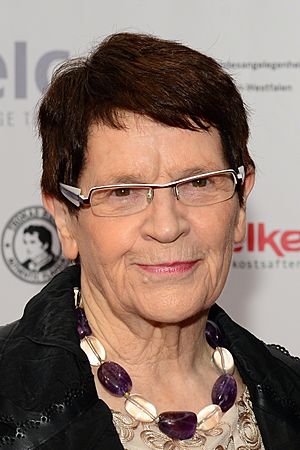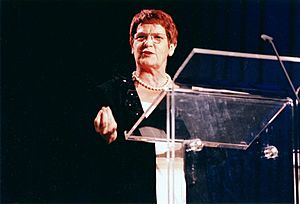Rita Süssmuth facts for kids
Quick facts for kids
Rita Süssmuth
|
|
|---|---|

Süssmuth in 2014
|
|
| President of the Bundestag West Germany until 1990 |
|
| In office 25 November 1988 – 26 October 1998 |
|
| Preceded by | Philipp Jenninger |
| Succeeded by | Wolfgang Thierse |
| Federal Minister of Family Affairs, Senior Citizens, Women and Youth | |
| In office 26 September 1985 – 25 November 1988 |
|
| Chancellor | Helmut Kohl |
| Preceded by | Heiner Geißler |
| Succeeded by | Ursula Lehr |
| Personal details | |
| Born | 17 February 1937 Wuppertal, Germany |
| Died | 1 February 2026 (aged 88) Neuss, Germany |
| Political party | CDU |
| Alma mater | University of Münster |
Rita Süssmuth (born Kickuth; 17 February 1937 – 1 February 2026) was an important German politician. She was a member of the Christian Democratic Union (CDU) party. Rita Süssmuth became the tenth President of the Bundestag, which is like the speaker of the German parliament.
She held several key roles in government. From 1985 to 1988, she was the Federal Minister for Youth, Family, and Health. Later, from 1988 to 1998, she led the German Bundestag. Her time as President of the Bundestag lasted almost 10 years, making her one of the longest-serving leaders in that role. Besides her political work, she also led the European Movement Germany for a few years.
Contents
Early Life and Education Journey
Rita Süssmuth was born in Wuppertal, Germany, on February 17, 1937. She grew up in Wadersloh during her childhood. After finishing high school in 1956, she went to university.
She studied languages like French and history in cities like Münster, Tübingen, and Paris. In 1961, she completed her first degree, which prepared her to become a teacher. She then continued her studies, focusing on education, how societies work (sociology), and how people think (psychology).
In 1964, Rita Süssmuth earned her Ph.D. from the University of Münster. Her special research project was about how children are shown in French books. After her studies, she became a teacher and professor. From 1966 to 1982, she taught education at universities like TU Dortmund University and Ruhr University.
Starting a Career in Education
Before entering politics, Rita Süssmuth had a strong career in academics. From 1963 to 1966, she worked as a research assistant at the universities of Stuttgart and Osnabrück. She then became a lecturer.
She taught about education, including how different countries approach schooling. In 1971, she became a professor of Educational Science. She also joined an advisory board for the Federal Ministry of Family Affairs. This showed her early interest in public service.
From 1982 to 1985, she directed an institute in Hanover that focused on women and society. Even when she became a politician, she continued to teach special classes at the University of Göttingen.
Her Important Political Roles
Minister for Family and Health
Rita Süssmuth began her political career in a big way. From 1985 to 1988, she served as the Federal Minister for Family Affairs, Senior Citizens, Women, and Youth. She worked under Chancellor Helmut Kohl.
During this time, a serious health challenge known as the AIDS crisis emerged. Rita Süssmuth bravely pushed for more education and ways to prevent infections. She encouraged people to use protective measures, even when some members of her own party and the church disagreed. In 1987, she helped create the National AIDS Foundation. She also made sure more money was given to research ways to fight AIDS.
Leading the German Parliament
Rita Süssmuth was a member of the German parliament, called the Bundestag, from 1987 to 2002. She was elected several times to represent the area of Göttingen.
In 1988, she became the tenth President of the Bundestag. This is a very important role, similar to a speaker who leads the discussions in parliament. She held this position for ten years, until 1998. During her time as President, a major historical event happened: the German reunification, when East and West Germany became one country again.
She also played a role in international relations. In 1989, she supported an agreement between East and West Germany about recognizing the border with Poland. For many years, from 1986 to 2001, she also led the Frauen Union. This was an organization for women members of her political party, giving her a strong voice within the CDU.
Views on Important Issues
Rita Süssmuth believed in making international organizations more democratic. She supported the idea of a United Nations Parliamentary Assembly. This group wants to make the United Nations more representative of people around the world.
She also stayed involved in her party's decisions. For example, in 2021, she publicly supported Armin Laschet to become the leader of the Christian Democratic Union party.
Contributions After Politics
Even after leaving her main political roles, Rita Süssmuth continued to work on important issues. In 2000, she led a special group to review Germany's immigration policies. This group worked to create new ideas for how Germany could welcome and integrate new people. Their detailed report was published in 2001.
She also became a member of the Limbach Commission in 2002. This group helps resolve issues related to art that was taken during the Nazi era. From 2005 to 2010, she served as the President of the Berlin OTA Private University.
Rita Süssmuth was involved in many other important organizations. She co-chaired a high-level commission on HIV prevention for UNAIDS. She also served on the board of trustees for the Technische Universität Berlin. Her work included promoting tolerance and fighting against prejudice in Europe. In 2018, she was a visiting professor at the University of Duisburg-Essen.
Awards and Special Recognitions
Rita Süssmuth received many awards for her dedicated work. These honors recognized her contributions to politics, society, and education.
- 1988 – Named Woman of the Year 1987 by the German Association of Female Citizens.
- 1988 – Received the Bambi Award.
- 1990 – Awarded the Grand Cross 1st class of the Order of Merit of the Federal Republic of Germany.
- 1997 – Received the Avicenna-Gold-Medal from UNESCO.
- 2004 – Honored by the Schwules Netzwerk NRW for her work in AIDS prevention.
- 2006 – Awarded the Magnus Hirschfeld Medal.
- 2007 – Received the Theodor Heuss Prize.
- 2007 – Honored with the Reminders Day Award for her fight against AIDS.
- 2008 – Received the Viadrina-Preis from Europa-Universität Viadrina.
- 2011 – Awarded the Order of Merit of North Rhine-Westphalia.
- 2013 – Received the Edith-Stein-Preis.
- 2015 – Awarded the Reinhard Mohn Prize.
- 2016 – Became an honorary member of the Deutsche AIDS-Hilfe.
- 2016 – Received the Order of Merit of Brandenburg.
- 2019 – Became an honorary senator of the Technische Universität Berlin.
Academic Honors
Rita Süssmuth also received several honorary doctorates from universities around the world, recognizing her academic achievements and public service.
- 1988 – University of Hildesheim
- 1990 – Ruhr-Universität Bochum
- 1994 – Veliko Tarnovo University, Bulgaria
- 1996 – Sorbonne Nouvelle University, France
- 1998 – Johns Hopkins University, Baltimore, US
- 1998 – Ben-Gurion University of the Negev, Beersheba, Israel
- 2002 – Universität Augsburg
- 2018 – University of Rzeszów, Poland
Personal Life
Rita Süssmuth was married to university professor Hans Süssmuth from 1964 until his death in 2020. They had one daughter together. Rita Süssmuth passed away on February 1, 2026, at the age of 88.
 | George Robert Carruthers |
 | Patricia Bath |
 | Jan Ernst Matzeliger |
 | Alexander Miles |


